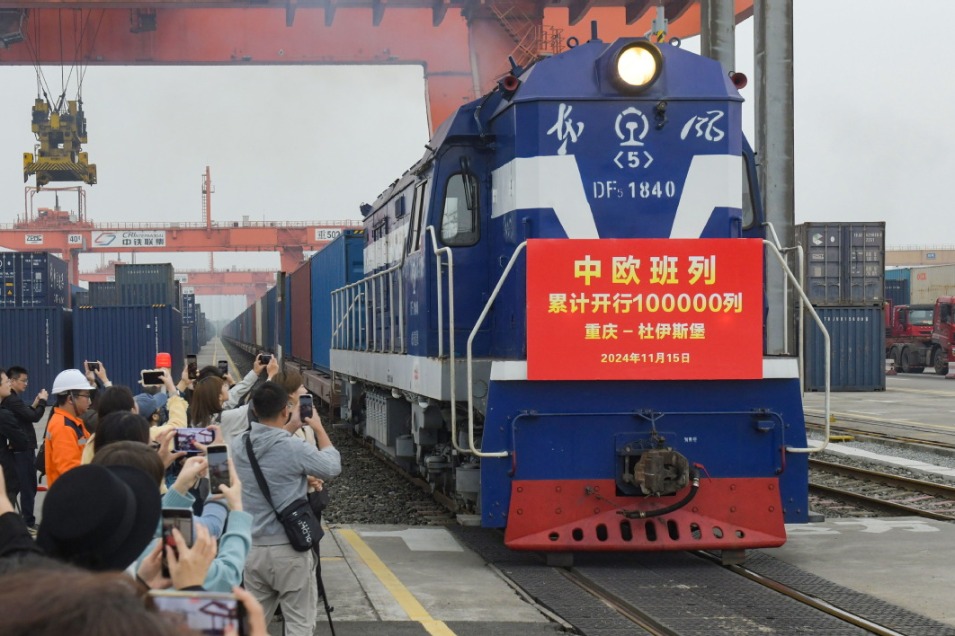Look at the greener side


The EU must decide whether to be tough on China or solve the contradictions caused by green transformation by jointly promoting the reform of WTO green trade rules with China
After Donald Trump starts his second term as president of the United States in 2025, his "America First" policy is expected to severely impact the European Union's green transition. It will also put pressure on the EU's economic and trade relations and climate diplomacy. The EU will face a test of whether it can maintain multilateralism and enhance competitiveness under strategic autonomy.
First, trade protectionism under Trump's "America First" policy will cause huge economic losses to the EU. During the election campaign, Trump said he would impose tariffs of 10 to 20 percent on imports, including the imports from the EU. The US and the EU are each other's largest trading partners. According to a research by Economist, Germany ranks third in the "Trump Risk Index", with its auto and machinery industries being in Trump's crosshairs.
It is expected that intensified trade protectionism will lead to the escalation of green friction between the EU and the US. The bilateral steel and aluminum trade dispute began during Trump's first term saw several fruitless negotiations under the Joe Biden administration. And the future of the EU and the US to reach a global sustainable steel and aluminum arrangement appears remote. This has hindered the EU's process of establishing an international climate club with the decarbonization of the steel and aluminum industries as the lead. This situation is not conducive for the EU to maintain the global competitiveness of its steel industry, and also damages the EU's leadership in global climate governance.
Second, Trump's energy independence policy could undermine the EU's industrial competitiveness. Trump's goal is not just to make the US "energy independent", but also to make it energy dominant. He has proposed to increase the production of shale gas and reduce the price of natural gas and electricity in the US by 50 percent. Energy prices in the EU are already higher than in the US because they include the indirect costs of decarbonization. If Trump's goals are met, the gap in energy prices between Europe and the US will widen further, undermining the EU's industrial competitiveness.
Third, Trump's cuts to clean technology investment could hurt EU investment in the US. Trump is likely to repeal or scale back the US' Inflation Reduction Act's subsidies for clean technology. This could change the course of US clean-tech investment. Commercial investment may continue to be available for mature renewable energy technologies, but policy fluctuations in the US may hinder access to noncommercial funding for less mature clean technologies. In addition, the deployment of offshore wind power and green hydrogen could also be hindered. European companies that have invested in clean technology in the US are likely to suffer.
Fourth, there is a high probability that Trump will withdraw from the Paris Agreement again, undermining the G20 members' climate ambitions and their commitment to action. The EU needs to bolster more diplomatic capacity, and invest more technology and financial resources in bringing the global climate governance process in line with the pace of the EU's green transition.
Fifth, Trump's policy of "decoupling" from China will lead to the loss of EU interests. In his first term, Trump imposed a policy of oppression on China with the trade war and technological Cold War as the core elements. This time, Trump plans to raise tariffs by an additional 10 percent on all imports from China. Given the EU's close economic and trade ties with China, a US-China economic "decoupling" would put enormous economic and diplomatic pressure on the US' allies, leaving Europe caught in the middle of the great power competition.
The EU is worried about the intensification of the ideological battle on issues such as trade and climate protection. In addition, Trump is hostile to NATO and has a contradictory attitude on the Ukraine crisis.
After congratulating Trump on his victory, European Commission President Ursula von der Leyen proposed that the EU would import more liquefied natural gas from the US to reach out to Trump. French President Emmanuel Macron and Polish Prime Minister Donald Tusk argue that the EU must build a more independent defense policy. Hungarian Prime Minister Viktor Orban and Serbian President Aleksandar Vucic are supporters of Trump's populism. But France and Germany are facing the test of domestic politics. The above factors make it a test whether the EU can maintain multilateralism under strategic autonomy and enhance the competitiveness of its green transition in the face of the "Trump Risk".
First, the EU needs to respond to Trump's economic challenge with pragmatism. Considering the contempt and violation of World Trade Organization international trade rules by the US and the fact that the world has entered the stage of "slow globalization", the EU has adopted independent unilateral instruments in some areas while complying with the basic WTO global trade rules. On the one hand, the EU continues to develop bilateral or regional free trade agreements with trading partners. On the other hand, based on its own market position, the EU uses trade defense tools and autonomous climate trade norms to compete fiercely with trading partners in the green transition.
Second, the EU needs to reconcile industrial competitiveness with the pursuit of strategic energy sovereignty and carbon neutrality. At an informal meeting of EU leaders on Nov 8, the EU underlined that it must close the innovation and productivity gap with its global competitors. European Commission President Ursula von der Leyen's commitment to a new "Clean Industrial Deal" within 100 days of taking office highlights the Commission's determination to improve the strength of the EU's clean industry. At a hearing in the European Parliament, Climate Commissioner Wopke Hoekstra laid out the EU's twin goals of pursuing "strategic energy sovereignty" and "climate neutrality by 2050".
If the EU can balance the three tasks of reducing foreign energy dependence, developing its clean energy industry and reducing greenhouse gas emissions, it can protect its green transition from Trump's challenge.
Third, the EU needs to recognize that China-EU cooperation is in line with its interests, and is conducive to maintaining the global multilateral order. The EU needs to seriously assess whether taking sides and being tough on China will enable it to secure a close US-EU relationship to protect its interests. China is one of the EU's most important economic and trade partners and a co-defender of global multilateral rules. China is also one of the world's important providers of green public goods. The economic and social contradictions caused by the green transformation in the EU need to be solved by jointly promoting the reform of WTO green trade rules with China and sharing the dividends of green industry cooperation. Although China-EU cooperation will encounter more difficulties, it is a pragmatic choice with strategic significance and cost effectiveness.
The author is an associate researcher of the Institute of European Studies at the Chinese Academy of Social Sciences. The author contributed this article to China Watch, a think tank powered by China Daily.
The views do not necessarily reflect those of China Daily.
Contact the editor at [email protected].

































